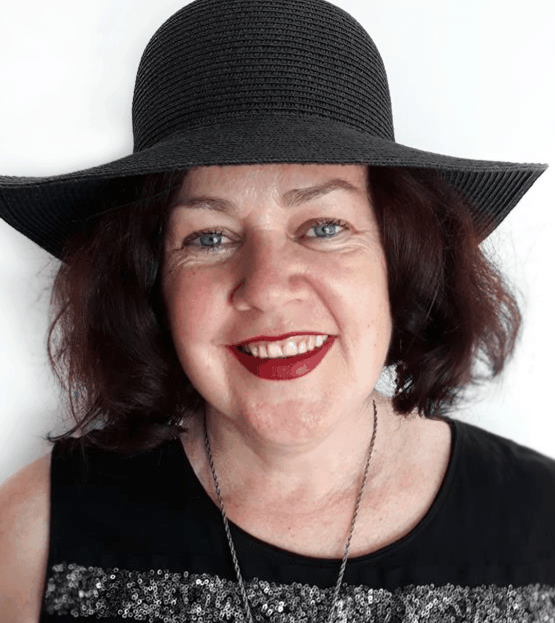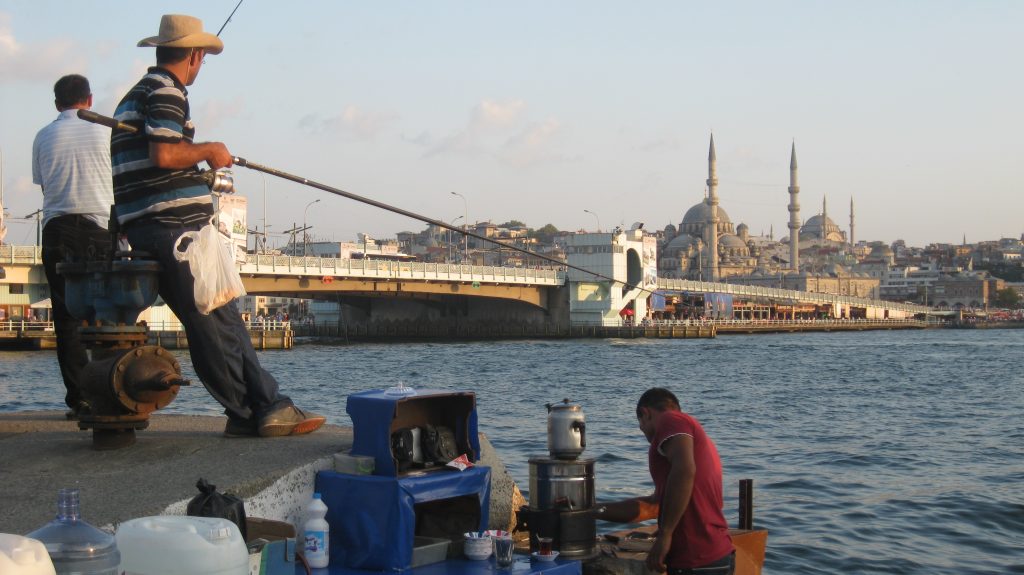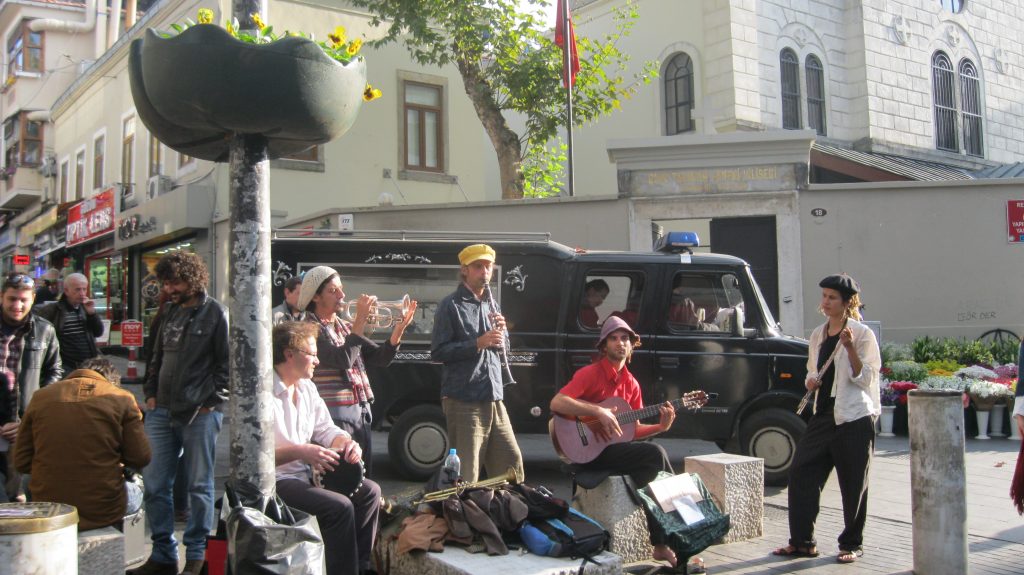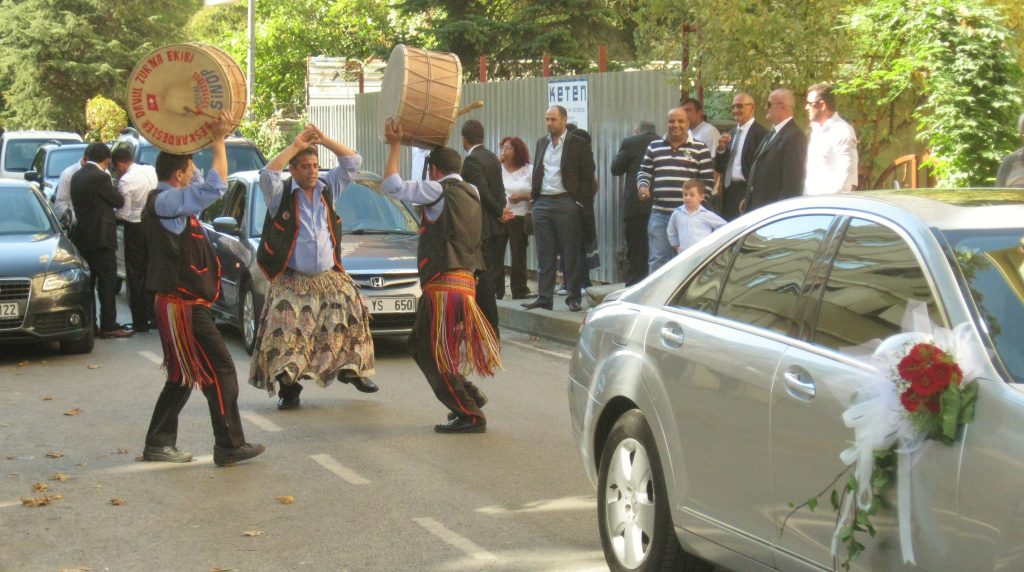I met Lisa Morrow for the first time at Story Café, a modern coffee shop in Kadıköy popular among both Turks and foreigners where one is just as likely to hear English and Turkish that offers traditional Turkish kahvaltı along with pancakes, cinnamon rolls, and breakfast burritos. The venue seems suitable for an interview about a foreigner’s experience in Turkey and the ways old and new, East and West coalesce in modern Istanbul society.
Lisa was born and raised in Sydney, Australia and while she currently lives in Lisbon, Portugal, she previously lived in Turkey for ten years and still visits Istanbul frequently. Lisa demonstrates a profound passion for Turkey as we discuss her various memories and experiences here, a deep nostalgia and enthusiasm emerge in her tone. She even comments offhand that she prefers the energy here over Lisbon and finds her current city dull in comparison. Conversing with her is invigorating. We’ve all met bitter foreigners here who exasperate us with their constant (and sometimes racist) diatribes about how much they hate Turkey, leaving us wondering why they’re here if that’s how they really feel. However, Lisa always seems to find the treasures and joys of being in Turkey and never tires of them, and this sense of “feeling at home” in Turkey comes through in her palpable and vivid writings.

One passage from Lisa Morrow’s essay on riding Istanbul ferries eloquently captures this sense of finding her home here: “Riding an Istanbul ferry as it slowly crosses the Bosphorus is like being suspended in time. While the journey is short, I am instantly taken back to my childhood, to endless days, freedom and adventure. I feel sadly nostalgic for the past but excited too because I feel I am traveling with early explorers to an unknown land. My journey begins from the safety of the European side of Istanbul but we are heading for Asia and the unknown lands beyond” (Excerpt taken from “Exploring Turkish Landscapes: Crossing Inner Boundaries”).
As Lisa and I sat at Story in intimate dialogue about our lives in this city of exquisite contrasts, stories, and journeys, I am reminded of how fortunate we are to call Istanbul home. Of course, there are challenges and difficult days and toxic individuals, but Lisa’s example proves that there are always friends, opportunities, serendipities, and miracles available to us here if we open ourselves up to such a possibility.
How did you get started in writing about Istanbul and Turkey in general?
Back in 2008, there were elections in Turkey. I had been trying to get a rather bad manuscript published about my life when I first came to Turkey in 1990. I had gotten in touch with a radio presenter in Australia and she remembered me. She contacted me and asked if I would speak on her radio program about life in Turkey, what it was like and what the atmosphere was like at the time. She suggested I write a few stories to do that. So I wrote the stories and I gave the interview and I thought, Well this is something I could do.
But I didn’t do much because I was between countries and indecisive and moving a lot. I’m a big fan of William Dalrymple’s work and I wrote to him. I saw him on the same woman’s television program when she interviewed him and I wrote to him and he suggested that I write stories about Istanbul and so I did. And that became my first book Inside Out in Istanbul: Making Sense of the City.

What attracts you most about Turkey or Istanbul in particular?
Big question! It’s got enormous energy, a lot of variety, and I feel at home here in a way that you can’t really articulate. You either get it or you don’t. And everyone who gets it has their own specific reasons. I’m a very open person and I talk to anyone. And that’s really appreciated here. Since my Turkish language skills have improved, I get to talk to a lot of people. But the thing I particularly like about Istanbul is this mix of tradition and modernity. For example, right now we’re in a very modern style Turkish café with single blend coffee, etc. Istanbul has embraced third wave coffee, but they’ve done it on their own terms with a great deal of hospitality and their own traditional foods.
Other examples would be my woman friends who do the kına gecesi, the traditional night where the bride gets together with all her friends and gets henna on her hands and dances. Then on my street in Ramadan, we often get a man who comes along and plays the ney on his knees. He knee-walks down the street and plays and then asks for money. And we get piano accordion-playing Gypsies too. On the other hand, I can ring up my local pide place using my mobile and they go, “Hello Lisa Hanım. Sipariş var mı?” They’ve got my details recorded. They know who I am. It’s completely modern. You’ve got this old world hospitality with this new world technology. It’s also very good for your Turkish practice. The first time you ring up you have to give your address. That’s how I learned to say kapı numarası (street door or apartment number). They have some program so that when my number rings them now, they know who I am and my address. It’s really cool. It’s not that developed in Australia. You just can’t do things like that.
What are some of your favorite memories of Istanbul?
Way back before modernity hit in the way of Americanisms and Starbuck’s and things like that, I used to go to the büfe down in Kadıköy that lined the water and drink very strong and very bad Nescafe in the summer and watch the ferries come in. And now where all the dolmuş are by the wharf, they used to have a flower market. And they used to sell animals. And it’s highly illegal, but they used to have monkeys. Unfortunately, they had a monkey on a chain. I remember in 2000, it was $1000 for the monkey. And everyone would go and watch the monkey. I’m not saying it’s a good thing, but it’s the way it was.
Things like catching a ferry across the Bosphorus and sitting outside and watching everyone throwing simit to the seagulls and how in winter when they had the musicians on the ferries. I remember I was on the ferry a couple of months ago and they were singing a Turkish song. I don’t know the name but I know the words. And everyone started singing it. The whole ferry, young and old. And what I love is, you meet someone for tea at 5:00, you meet another group for dinner at 7:30, and then someone says, “Let’s go to Ali Usta and have ice cream.” So you’re having ice cream at 10:00 and you’re by the tea gardens at 11:00. This is in the summer of course. And everyone has to get up hideously early, but you don’t care because you’re just enjoying your friends and laughing and having fun and asking about each others’ families. How did it go with the job interview? Are you still having problems with your boss?
What are some of your plans for the future?
I’ve been doing my blog. I’ve written my books. And I’ve written content for the luxury magazine market. I’d like to get more travel writing work about Turkey because I read a lot of really bad stuff. A recent article in an American paper equates Turkish attitudes toward religion as “Middle Eastern.” And if any Turkish friend of mine read that, they’d be offended. I’m really tired of these stereotypes. So I’d like to write more about what it’s really like. That it’s just an ordinary place full of ordinary people with a large diverse population.
When I investigate something that I think is really unusual and interesting, it becomes a bit too niche for the international market. For example, about five years ago, I interviewed my baharatçı (spice seller) about the fact that Turkish spices are limited in a normal Turkish kitchen. And he told me how everything was very regional in the past. At the time no one was particularly interested in knowing about it. Now the regional nature of Turkish cuisine has suddenly become the thing to write about. I’ve also started writing pieces about Turkish culture and the intersection between non-Turkish culture and Turkey. For example, I wrote a piece called “Cut from the Same Cloth” about how wearing my beret once put me in the position of being in Eminönü with all these men winking at me because they thought I was a sex worker. I’ve traveled and lived outside of Istanbul and places where you meet people who have come from the village yesterday and you’re the first foreigner they’ve ever interacted with. All they know is what they see on television. Often when people write about their experiences in Turkey, particularly foreign women, they tend to compare them to encounters in their own country and completely miss the point. You can’t possibly compare Istanbul or Turkey to your own country because the concepts of guilt, shame, sexual equality and so on don’t play out in the same way. Turkey is a very moral country, but morality, ethics, and principles are framed very differently from in the US, Australia, Europe and so on.

Could you speak a little about your writing process?
I tend to get ideas and then I mull them over for quite some time. I might be on a bus or walking or talking to someone and I’ll get an idea and I’ll jot down some notes on my phone. Or sometimes I’ll have a larger idea and record things. I’m very stimulated by visuals and sounds. I take a lot of photos of a lot of things. Sometimes I do this to trigger a memory of why did I do this? What was I doing there? Why is this important? What was happening on that day?
I also record sounds. I have no formal training in the sort of writing I do. I’ve had academic writing training. This might sound childish, but when I write I close my eyes and I try to recreate the sound, sights, and smell in my mind because smells are really important to me. The fresh smell of simit. Going past a bakery when the bread’s just come out. Not being particularly hungry and then passing a kebab shop. The acrid sweat of teenagers packed on a bus. The sewers in summer. None of that is particularly romantic, but it all helps put me back where I was. This is my aim with my stories – that people who read them feel they were here.
Are there any other places that attract you and you like to write about?
It’s quite ironic because when I was at university I studied art history, which I was much better at than art itself. But I have a real passion for architecture. I gravitate towards any country or town that has Islamic architecture. I like Spain for its Moorish architecture because of Islamic influences. I particularly love places like San Sebastian. The energy in that town is just fabulous! They seem to have a festival every weekend. Everyone drinks and runs around like mad! It’s a great place. You’ll never get cheap accommodation, but it’s worth going once in your life, in the summer. They have two beaches. Wonderful!
A year ago, I went to Genoa and I found Genoa really fascinating. The Genoese principality built Galata Tower in Istanbul and Genoa has all these fabulous funiculars and elevators like Tünel and I love funiculars. It’s just a passion of mine. And so when I went there, I found a bit of a parallel between Turkish history and Genoese history. And the same as when I went to Romania. There’s a lot of words in Romanian that come from the Ottoman Empire.
You seem very accomplished and successful. Do you have any advice for budding writers?
Work! I think I started my blog in 2013. I was very unschooled in everything to do with social media. I read a great deal on the internet and the most useful thing I found was while you are writing, you have to build up a platform because you need a public profile. It helps you get published. But then again, until you get published, it’s hard to get a profile. What you need to do is look at the social media that’s around and don’t spread yourself thinly across Facebook, Instagram, etc. Choose the one you’re most comfortable with at first to promote your writing.
Also, if you’re serious about writing, don’t fall for the trap of writing for exposure too often. It can be really hard to get out of that. Exposure doesn’t pay the bills and it’s really better to get a token amount like $20 or $50 than nothing at all. I have written for exposure and small amounts of money and still do, but you have to consider the fact that different magazines are rated differently. For example, I had a piece completely unrelated to Turkey published in The Independent in the UK and all of a sudden I was accepted into a travel website for writers trying to break into the industry. Then I was published in the American Express’ website. Suddenly editors who never got back to me were getting back to me. Your writing should stand out in some way, but having said that, I couldn’t advise you on what stands out because I’ll write something that’s really unusual and obscure and I don’t get it published and other times I think, God how many times could somebody possibly write about a topic I think has been done to death? And then I get a piece published.
I know a lot of people who have done creative writing courses in the States focus on “what’s my niche?” And “should I be doing this?” I’m not saying it’s a bad thing, but there’s so much angst involved. Write what you’re passionate about. Write about what you enjoy. And the main thing is to write. To me, there’s no such thing as too much detail, but that’s not actually professional.
The hardest thing for me was when I sat down with a professional editor who wanted me to cut and change things. Unless you’ve got a good reason, like the editor completely misunderstood what you were saying, or they wanted to change what you’ve written to have a totally different focus, you have to be a bit flexible. They’re the ones deciding if you get paid or not. And you have to decide if you’re going to get precious about your work, or if you’re going to get published.

Is there anything else you want to say about yourself and your work?
While I love writing my blog, a lot of people don’t realize that it’s self-funded and my books are self-published too. To be blunt, traditional publishers want to read about blonde girls coming to Turkey and falling in love with a man with a mustache. They’re not interested in focusing on the everyday extraordinary in Turkey I see. I look for similarities. What is similar in our cultures? What do we see that we feel the same about? We might express it differently, we might do it dıfferently, but we share the same joys, the same sorrows. That’s what I capture in my memoir, Waiting for the Tulips to Bloom: Adrift in Istanbul. I’m proud the readers find it honest and direct because it captures the contradictions and challenges of living in Turkey. That’s what I set out to do.
For more information on Lisa Morrow’s books and to access her articles and blog, visit here. To buy Lisa Morrow’s book Inside Out in Istanbul, check out here.









